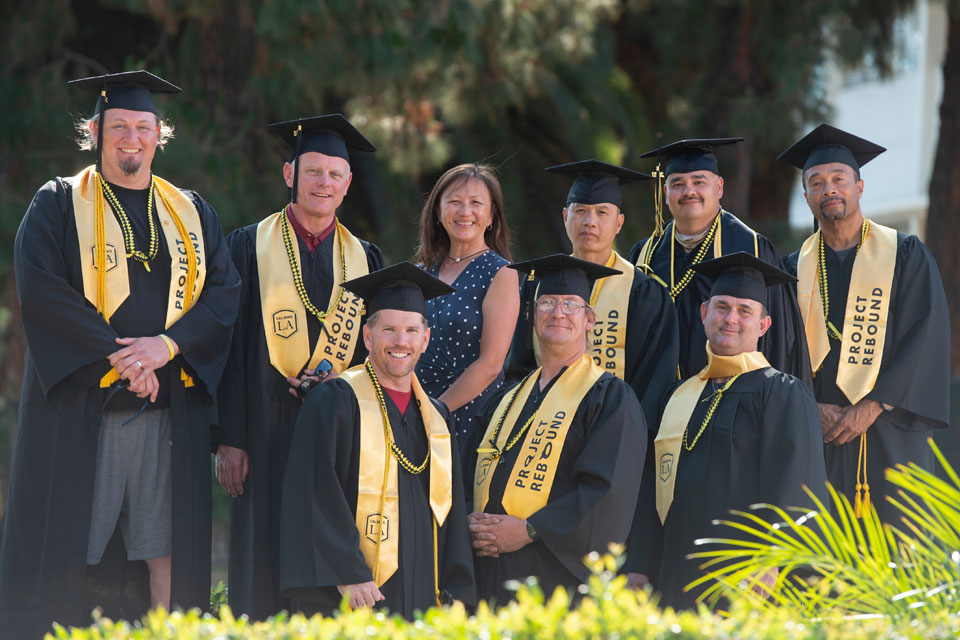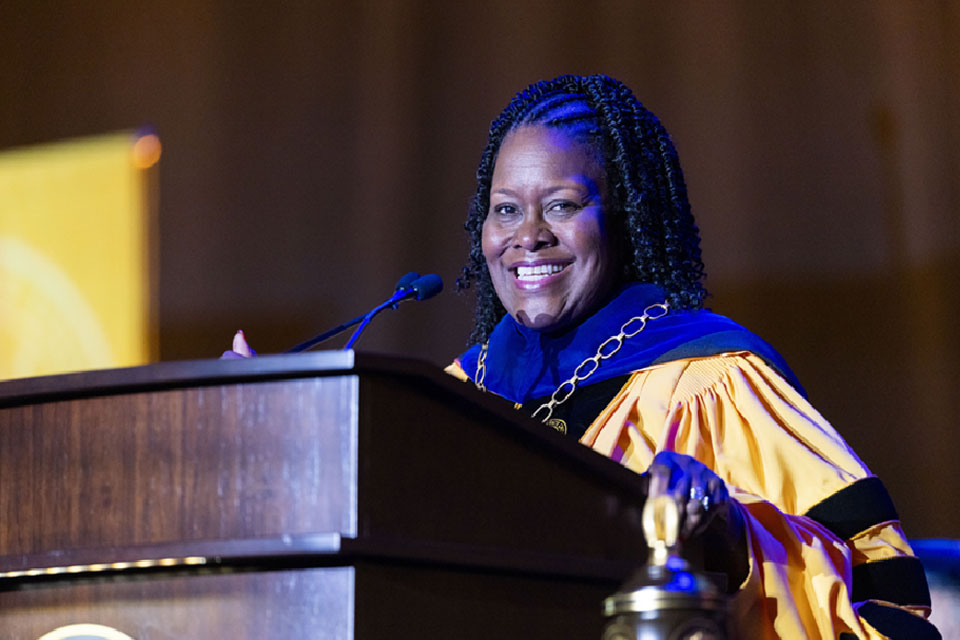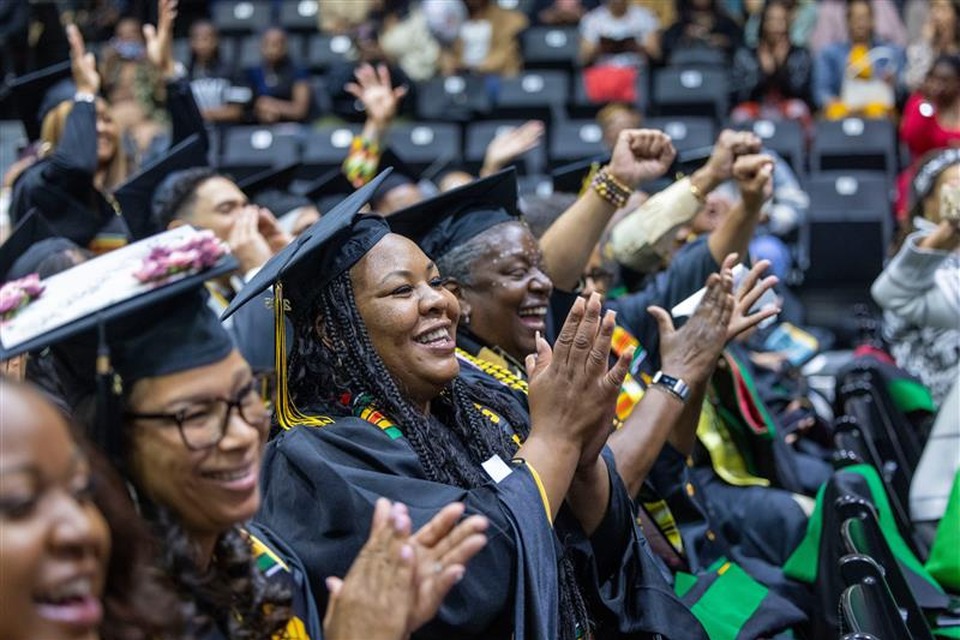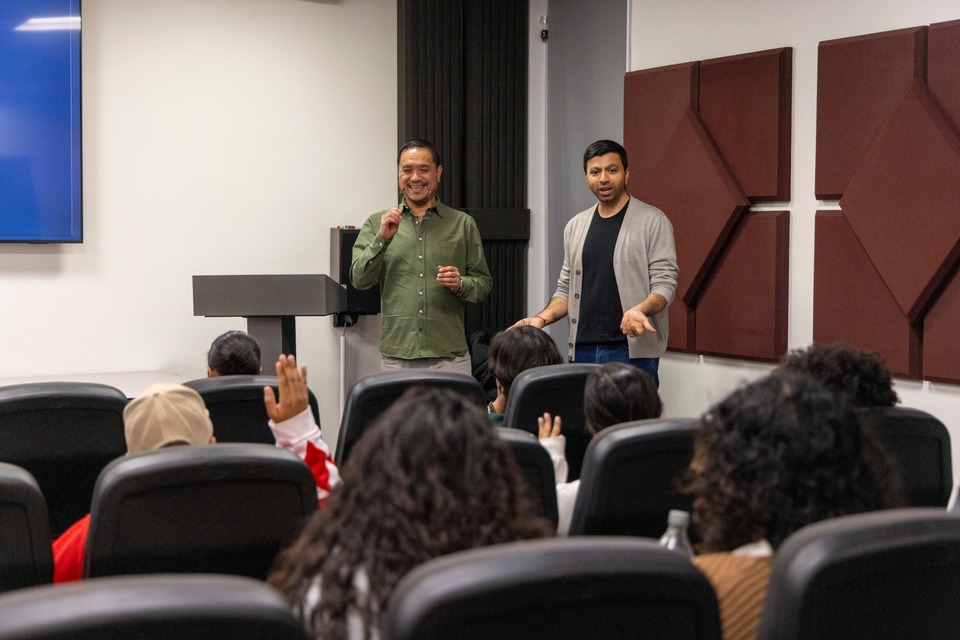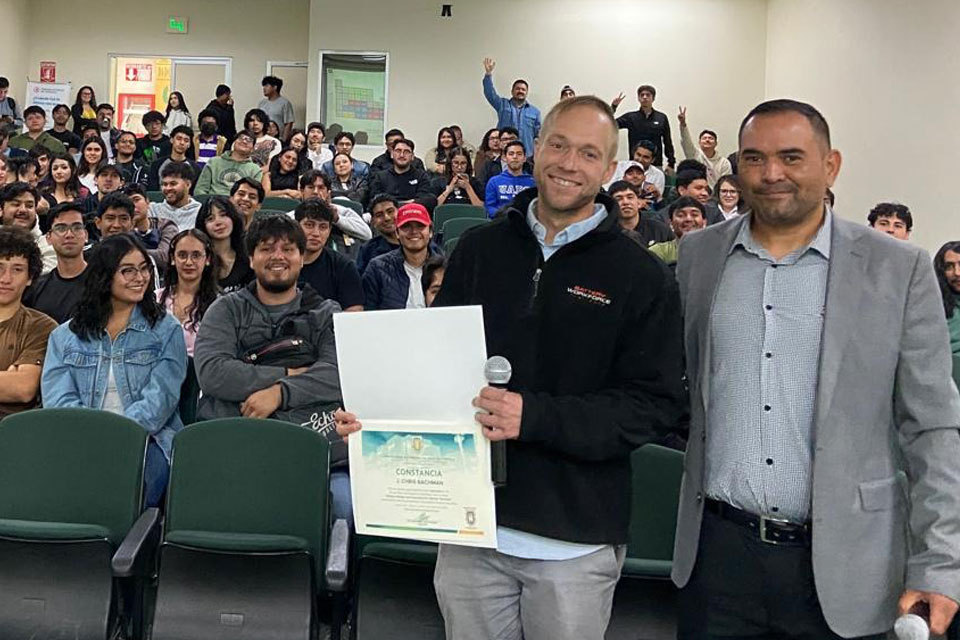Inside a classroom at a prison in Los Angeles County, incarcerated men embark on a journey.
When they step inside the classroom, the men are no longer just incarcerated. They are more than the mistakes they’ve made. More than society’s view of them. More than their inmate number.
Here, they are college students.
If you were to ask the men in this classroom about their experiences as students of Cal State LA, this is what they would say:
“Whatever happened in the past, at Cal State LA, they offer a chance at a fresh start,” says one student.
“Cal State LA has helped me find purpose in life—redemption through education,” says another.
“Cal State LA has shown us that we can be more than what we were.”
Cal State LA’s Prison B.A. Graduation Initiative is the first in-person bachelor’s degree completion program for incarcerated students in California—and the program is transforming lives.
Since its inception at California State Prison, Los Angeles County in Lancaster, more than 40 students have participated in the program. Nine of them have now earned their bachelor’s degrees and this week will become the first to walk across the Commencement stage as Cal State LA graduates.
The graduates will celebrate their accomplishment during the College of Arts and Letters Commencement ceremonies on July 28 at Cal State LA’s Reeder Field. The four graduates in the Class of 2020 will walk the stage at the 8:30 a.m. ceremony, and the five graduates in the Class of 2021 will take part in the 12:30 p.m. ceremony.
“In my mind, I was only ever going to walk across the visiting room. For me to be able to walk across the stage on campus—I can’t describe it—it’s amazing,” says Class of 2021 graduate Tin Nguyen, who received a commuted life sentence and was released from prison in 2020. “I can say it’s going to be one of the best moments of my life.”
Being recognized at Commencement alongside fellow Golden Eagle graduates will be the culmination of a life-changing transformation for the men from Cal State LA’s Prison Graduation Initiative.
“Cal State LA’s prison education program has lifted these students to greater opportunity and hope,” says Jose A. Gomez, Cal State LA’s executive vice president and provost. “I believe there is no more compelling example in the entire nation of the power of education to transform, heal and empower.”
Cal State LA soon plans to expand the initiative by establishing the state’s first in-person bachelor’s degree completion program for incarcerated women. It will be conducted at the California Institute for Women in Chino in partnership with Chaffey College.
The lessons learned from the program at California State Prison in Lancaster will inform the new program in liberal studies being created for women.
Cal State LA’s Prison B.A. Graduation Initiative was launched in 2016 with support from The Opportunity Institute’s Renewing Communities Initiative, President Barack Obama’s Second Chance Pell federal pilot program, and later the Andrew W. Mellon Foundation.
The founding leadership team included Executive Vice President Jose A. Gomez, Center for Engagement, Service, and the Public Good Executive Director Taffany Lim, and Professor Bidhan Roy. Working in collaboration with the California State Prison in Lancaster, and the California Department of Corrections and Rehabilitation, the team created California’s first in-person B.A. program.
Roy was a volunteer in the prison nearly seven years ago. He worked with a nonprofit helping men incarcerated at Lancaster learn to train shelter dogs at the prison’s progressive programming facility (PPF). PPF is a voluntary program that houses men who demonstrate good conduct and a dedication to personal growth.
While volunteering on the prison yard, Roy, a professor of English, started giving writing and literature lessons. He’d teach in the housing unit and sometimes on the yard, as men did pull-ups nearby. The students were eager for more, he recalls. Many had already earned multiple associate’s degrees by then, thanks to a 2014 California law that spurred rapid growth of community college education for incarcerated students. But they hit a ceiling on their higher education without a bachelor’s degree program.
In 2016, Cal State LA launched the Prison B.A. Graduation Initiative. Drawing on expertise from across the university, the initiative is a collaboration between the university’s Center for Engagement, Service, and the Public Good, the Department of Communication Studies in the College of Arts and Letters, and the College of Professional and Global Education.
Through the program, incarcerated students take one or two courses per semester toward a Bachelor of Arts in Communication, with a focus on organizational communication. For many of the men, the program was their first chance to aim higher on their educational journeys.
“The B.A. had a different significance to them,” Roy says. “[The program] shifted the narrative in prison about what is possible and also about their worth.”
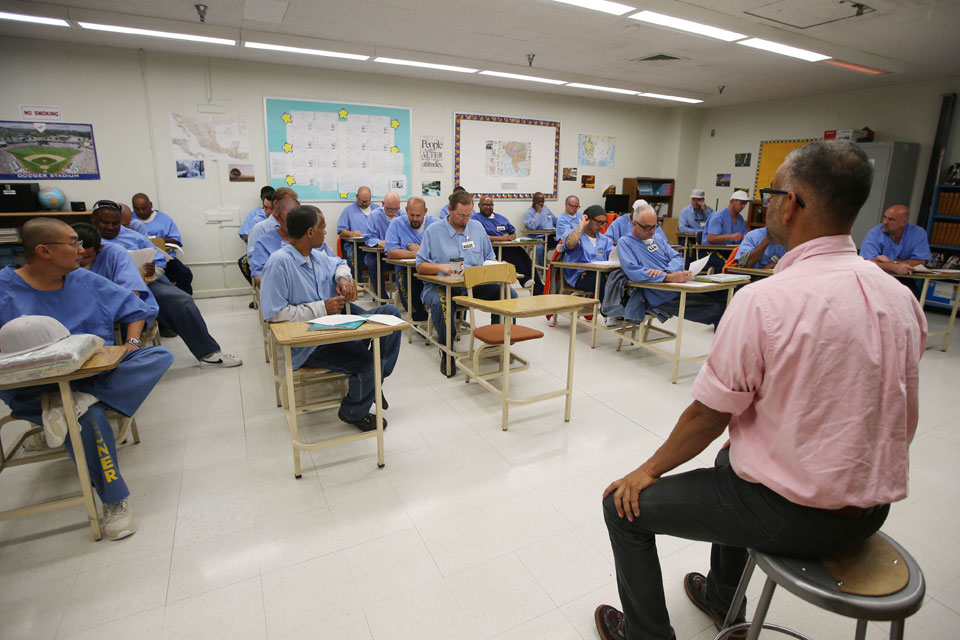
Studies, including those conducted by the RAND Corporation and the Vera Institute of Justice, have shown that prison education programs can help reduce recidivism—the rate at which incarcerated people who are released return to prison—and save state taxpayer dollars. Among the factors that contribute to education’s effects in reducing recidivism are participants’ increased employment opportunities upon release from prison and changes in their cognitive abilities and behavior, according to the Prison Studies Project at Harvard University.
“The degree is transferrable to every part of our lives,” says Clifton Gibson, who was released from prison in 2019 and earned his degree with the Class of 2020. “Having that guidance from the professors and from Cal State LA has been instrumental in not only my transition, but my personal development. It gave me different eyes and perspectives of where I was in life, where I wanted to go and where I’ve been.”
Cal State LA’s B.A. program has equipped the incarcerated and formerly incarcerated students with critical thinking skills, writing abilities and experiences that have fostered personal transformations.
“Getting involved in the B.A. program, as the classes proceeded from English to interpersonal communication, violence in literature and public speaking, everyone is respectful, everyone is anxious to learn, and I just began to grow,” a student said in a powerful documentary short about the program produced by Cal State LA students in 2018.
The students in the program have had opportunities to publish their academic work in the Prison BA Journal, a publication of the Department of Communication Studies, and Colloquy, another department journal. In spring 2019, Cal State LA students taking an animation course on the university’s main campus collaborated with Lancaster students to bring some of their writings to life through 14 animated documentary shorts.
The Lancaster students recorded their narrations, which were then paired with the animations, as part of the project, overseen by professors Zachary Zezima and Kamran Afary. The pieces explore the inner and outer lives of the incarcerated students, exploring issues of emotional awareness, communication, trauma and love.
The impact of the program goes beyond the individual incarcerated students who have been given the opportunity to earn a degree. The transformation extends to the society to which they are returning.
At first, student Allen Burnett says, he struggled with the college courses, haunted by childhood memories of being told he couldn’t keep up in school because of learning disabilities. But Cal State LA’s program allowed Burnett to view himself in a new light.
He reflected in a speech at the prison in 2018: “I began to rewrite my narrative by changing my outlook on life, no more shackles hindering my progress.”
Burnett’s life sentence was commuted and he was released in 2020. He will walk across the stage at Commencement as part of the Class of 2021 and will begin a graduate program in communication studies in the fall.
“For me, getting a bachelor’s degree means more than just getting a piece of paper,” Burnett says. “I have a responsibility to the people that I harmed to continue my education because this is what I said I was going to do. There’s a lot of narratives going on, but at the end of the day, it’s important because it has an impact on so many other people the same way that my crime did.”
The faculty who teach in the prison say they feel changed by their experiences, too.
For many, the reality of teaching the men in the program transformed any preconceived notions they may have held about incarcerated people.
“For me, it has completely uprooted and reframed the way that I think about prisoners and the prison system,” says Cynthia Wang, an assistant professor in the Department of Communication Studies.
Most students in Cal State LA’s program have been behind bars for decades, many since their teen years. Through the program, some have become the first person in their family to earn a college degree. Others now have an opportunity for freedom and a chance to contribute to society through a commuted life sentence. All have felt changed for the better.
“It really speaks to what Cal State LA and the whole CSU is all about,” says Taffany Lim, executive director for Cal State LA’s Center for Engagement, Service, and the Public Good. “It’s about helping to lift up and offer social mobility to people who may not have thought that was an option for them.”
Before the pandemic, Wang and 14 other faculty members in the Department of Communication Studies, led by Department Chair David Olsen, made the 90-mile drive weekly from Cal State LA to the prison on the western edge of the Mojave Desert in the Antelope Valley.
By the fall, more than 30 students are expected to have earned their degrees since the start of the program, Lim says. A total of 12 students from the program have received commuted sentences and are supported by Cal State LA’s Project Rebound, a program that assists formerly incarcerated individuals with re-entry and their continued education following their release. Of those celebrating their graduation at Commencement this week, one has started a business, one has joined a nonprofit, and others have begun or will soon start graduate programs.
“[The program] has provided hope for those that are in line to receive an education. It’s now a deeper, longer pathway, with more opportunities,” says Brant Choate, director for the Division of Rehabilitative Programs in the California Department of Corrections and Rehabilitation (CDCR). “We’ve heard from the inmate population and officers on that yard—it has changed the culture and made it a safer place for the inmates and the officers to work.”
Cal State LA’s program was the first in-person bachelor’s degree program for incarcerated students, but other universities and colleges in the state are following its lead.
UC Irvine plans to start an in-person bachelor’s degree program in San Diego in fall 2022, and Pitzer College announced the start of a pilot program this year in Norco. Additional programs may also emerge following a move by the federal government to allow incarcerated students to apply for federal Pell Grants to pay for higher education.
CDCR officials laud the Cal State LA program for helping open the door to new bachelor’s degree programs in California’s prisons. “It is the crown jewel of our programs,” Choate says. “Cal State LA is the reason we are able to expand to other parts of the state.”
During the pandemic, the incarcerated students in Cal State LA’s Prison B.A. Graduation Initiative continued to learn virtually, using laptops purchased by the university with an emergency grant from the Andrew W. Mellon Foundation. Students at Cal State LA’s main university campus also received support to continue their studies during the pandemic, including Wi-Fi hotspots and laptop loans.
Faculty and administrators have been experimenting with technological tools like the Canvas learning management system and videoconferencing until in-person classes can safely resume. The experience has not been without its challenges. Virtual instruction in the prison was forced to pause during the winter when the students couldn’t access their laptops in the classroom on the prison yard due to movement restrictions related to COVID-19, Lim says.
Courses were able to resume in February, and students in their final capstone course used videoconferencing tools in Canvas to correspond with their professor about their research projects.
Choate says Cal State LA’s piloting of virtual education techniques with CDCR will help ensure that the department can maintain its rehabilitative programming for mental health and substance abuse treatment and other educational programs like GED preparation during any future pandemics. “The impact systemwide is going to be huge,” he says.
Since his commuted sentence and release, Gibson says, he has begun to adjust to life outside of prison with support from the Cal State LA community.
He now works for Initiate Justice, an L.A.-based nonprofit that advocates to end mass incarceration. He views his purpose as “living a life of service to my community and to the people I come in contact with.”
Gibson’s experience in the program gave him hope and a sense of community that he wants to pass on to others every day.
“I want to leave every engagement that I have with somebody on a good note,” he says. “I want them to come away from it knowing that I cared about them, that they mattered and that somebody believed in them.”
# # #
California State University, Los Angeles is the premier comprehensive public university in the heart of Los Angeles. Cal State LA is ranked number one in the United States for the upward mobility of its students. Cal State LA is dedicated to engagement, service, and the public good, offering nationally recognized programs in science, the arts, business, criminal justice, engineering, nursing, education, and the humanities. Founded in 1947, the University serves more than 26,000 students and has more than 250,000 distinguished alumni.
Cal State LA is home to the critically-acclaimed Luckman Fine Arts Complex, Pat Brown Institute for Public Affairs, Hertzberg-Davis Forensic Science Center, Hydrogen Research and Fueling Facility, Billie Jean King Sports Complex and the TV, Film and Media Center. For more information, visit www.CalStateLA.edu.

